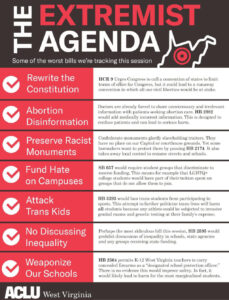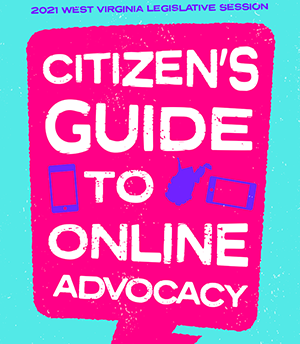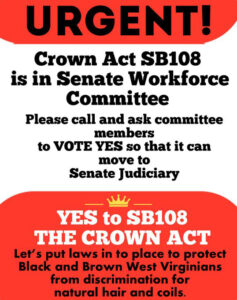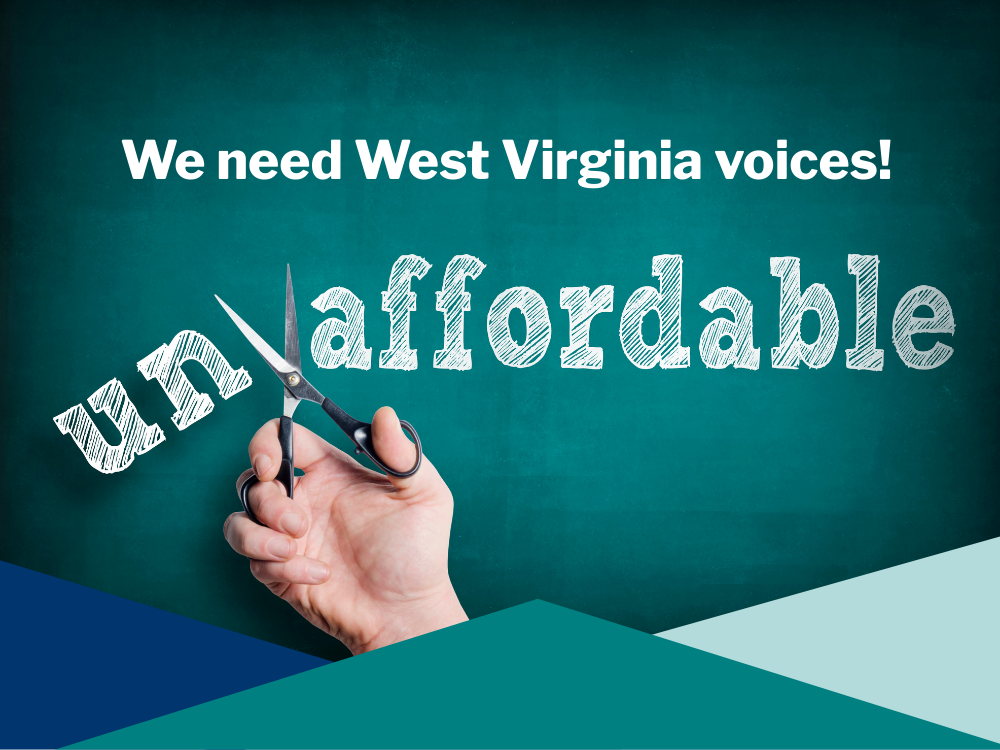- Like
- Digg
- Del
- Tumblr
- VKontakte
- Buffer
- Love This
- Odnoklassniki
- Meneame
- Blogger
- Amazon
- Yahoo Mail
- Gmail
- AOL
- Newsvine
- HackerNews
- Evernote
- MySpace
- Mail.ru
- Viadeo
- Line
- Comments
- Yummly
- SMS
- Viber
- Telegram
- Subscribe
- Skype
- Facebook Messenger
- Kakao
- LiveJournal
- Yammer
- Edgar
- Fintel
- Mix
- Instapaper
- Copy Link
Building Civic Action: A Policy Roundtable to Move Community to Action
Last week, I had the opportunity to participate in a policy roundtable hosted by the Charleston-Institute Alumnae Chapter of Delta Sigma Theta Sorority to discuss issues before the WV Legislature and their connection to and impact on the Black community. Thank you to Dr. Shanequa Smith of the Black Voter Impact Initiative and Crystal Good of Black by God for inviting me to be part of the conversation. Here’s a quick recap of what was discussed and actions you can take.
Charkera Erwin with Our Future WV discussed the CROWN Act, which would ban racial discrimination based on certain hair textures and hairstyle. CROWN stands for “Create a Respectful and Open World for Natural Hair.” The CROWN Act was first introduced last year, after Matthew Moore, a freshman basketball player at Woodrow Wilson High School in Beckley, was told his dreadlocks weren’t “neat” enough to play. The Act would ensure Black West Virginians can wear their natural hair free from discrimination. Identical bills (SB 108 and HB 2698) have been introduced in both houses, and both have been double referenced.
Organizers have been targeting committee chairs to get the bill placed on the agenda and their calls to action are working. It was announced over the weekend that the CROWN Act is on the Senate Workforce Committee agenda for Wednesday, but it’s important to keep the pressure on. Contact members of the Committee and your legislators and tell them to support the CROWN Act.
[Graphics provide by courtesy of Jamie Miller @dew_mouth)]
While the CROWN Act was languishing, the House Government Organization Committee (one of the committees where the Act was pending) advanced a bill to protect Confederate monuments (HB 2174) that by the end of the week had passed the House of Delegates. HB 2174, was one of several bills ACLU of WV Policy Director Eli Baumwell highlighted as being part of “the Extremist Agenda.” Other items on the agenda include attempts to rewrite the Constitution (HCR 9), forcing doctors to give medically incorrect information to patients seeking abortion care (HB 2982), and banning transgender students from playing sports (HB 3293). This agenda must be stopped!
 Lida Shepherd with the American Friends Service Committee shared some good and bad news related to bills affecting the criminal justice system. First, the good news. The House of Delegates has passed a bil to help advance restorative justice practices in West Virginia. HB 2094 recognizes the positive impact restorative justice can have for our kids and our communities. The bill is continuing to make progress and is scheduled to be taken up by the Senate Judiciary Committee later today.
Lida Shepherd with the American Friends Service Committee shared some good and bad news related to bills affecting the criminal justice system. First, the good news. The House of Delegates has passed a bil to help advance restorative justice practices in West Virginia. HB 2094 recognizes the positive impact restorative justice can have for our kids and our communities. The bill is continuing to make progress and is scheduled to be taken up by the Senate Judiciary Committee later today.
Now for the bad news. The House of Delegates passed another bill that will take West Virginia in the wrong direction on criminal justice reform with an extended supervision bill. HB 2257 would subject people convicted of drug related offenses to 10 years of extended supervision for people after they complete any underlying sentence, including any period of parole. Violation
of the supervision would result in additional incarceration of up to 10 years. Instead of creating pathways to employment, stable housing, and drug treatment, this bill would subject people to more supervision, strap them with additional fees, and make it more likely that they return to prison. All of this will drive up recidivism, put more strain on families, and cost West Virginia taxpayers more money. HB 2257 is currently pending in the Senate Judiciary Committee and we hope it stays there.
You can get regular updates from the West Virginia Criminal Law Coalition here, including calls to action for you to get involved.
I followed Lida to talk about a bill advancing in the Senate (SB 565) that would limit access to early voting, gut automatic voter registration, and make it easier to purge voters from the rolls for not voting. The Senate Judiciary Committee passed the bill last week, and it will be up for a vote by the full Senate on Wednesday. Contact your Senators today and tell them to oppose these unnecessary changes to restrict West Virginians’ access to voting.
Heading into the legislative session, we were initially optimistic about the potential to capitalize on last year’s record turnout to make expanded voting options, like no excuse absentee voting, that were available during the pandemic permanent. However, it’s obvious from the bills that have been introduced this session that the new Republican supermajorities aren’t willing to embrace those changes. Fortunately, we don’t have to rely on the Legislature. We have a once-in-a-generation opportunity under President Biden and the new Congress to transform our democracy and put a stop to the assault on voting rights with the passage of the For the People Act. More on that here.
The policy forum also featured Dr. Jessie Ice, Executive Director of West Virginians for Affordable Health Care, who discussed bills that are part of the WV Health Care for All Agenda that are languishing in committee. These include bills expanding Medicaid coverage to one year postpartum for women up to 300 percent of the Federal Poverty Level (HB 2266), capping cost for West Virginians for diabetes (HB 2708), and establishing a Minority Health Advisory Team (HB 2611). At this point, HB 2266, which is pending in the House Finance Committee, has the best chance of advancing ahead of Sunday’s deadline for bills to be out of committee. There’s still a chance for the others but they face additional hurdles and are both still pending in the House Health Committee.
Seth DiStefano with the WV Center on Budget and Policy briefed us on the dangers of the Governor’s proposal to slash the state personal income tax, which would increase overall taxes on the low- and middle-income household and create an immediate budget gap resulting in drastic cuts to vital services.
 This was a great forum which concluded with a tutorial on online advocacy from Crystal Good — (if you haven’t seen Crystal’s guide be sure to check it out here) — and closing remarks by Delegate Danielle Walker (D-Monongalia). A recording of the one-hour forum should be available on the Delta’s Facebook page soon. In the meantime, if you are interested in learning more about public policy in the Mountain State, be sure to register for this event celebrating young Black leaders working to shape the future of West Virginia.
This was a great forum which concluded with a tutorial on online advocacy from Crystal Good — (if you haven’t seen Crystal’s guide be sure to check it out here) — and closing remarks by Delegate Danielle Walker (D-Monongalia). A recording of the one-hour forum should be available on the Delta’s Facebook page soon. In the meantime, if you are interested in learning more about public policy in the Mountain State, be sure to register for this event celebrating young Black leaders working to shape the future of West Virginia.





